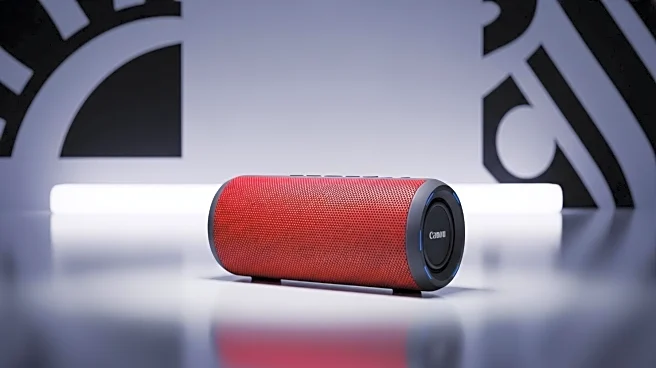What's Happening?
The JBL Flip 7 Portable Bluetooth Speaker is currently available at a record low price on Amazon, discounted by 27% to $110. This sale follows Amazon's clearance of Prime Day leftovers, offering significant savings on the popular speaker. The Flip 7 is known for its sleek design, impressive sound quality, and durability, being waterproof, dustproof, and drop-proof. It features a long battery life of up to 16 hours and can be paired with other speakers for a surround sound experience. The discount presents an opportunity for consumers to purchase a high-quality portable speaker at an affordable price.
Why It's Important?
The price reduction on the JBL Flip 7 highlights competitive dynamics in the portable speaker market, where brands vie for consumer attention through discounts and promotions. This sale may influence purchasing decisions, attracting budget-conscious consumers seeking quality audio devices. The affordability of the Flip 7 could boost JBL's market share, challenging competitors like Bose. The sale also reflects broader trends in consumer electronics, where price sensitivity and value for money are key factors driving consumer behavior. As brands leverage sales events to clear inventory, consumers benefit from access to premium products at reduced prices.
What's Next?
As the sale continues, consumers may see further discounts on JBL products and other electronics as Amazon clears inventory. The success of this promotion could encourage JBL to offer similar deals in the future, maintaining consumer interest and loyalty. Competitors may respond with their own discounts to retain market share, leading to increased price competition in the portable speaker segment. Consumers can expect ongoing opportunities to purchase high-quality audio devices at competitive prices, influencing buying patterns and brand preferences.
Beyond the Headlines
The sale of the JBL Flip 7 at a record low price underscores the impact of e-commerce platforms like Amazon on consumer electronics distribution. As online sales become more prevalent, traditional retail models face challenges in competing with the convenience and pricing strategies of e-commerce giants. This shift may lead to changes in how brands approach marketing and sales, prioritizing online channels and digital engagement. The evolution of e-commerce could also affect consumer expectations, with demand for transparency, fast delivery, and competitive pricing shaping industry practices.









